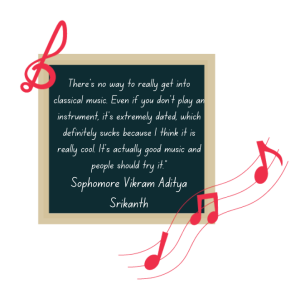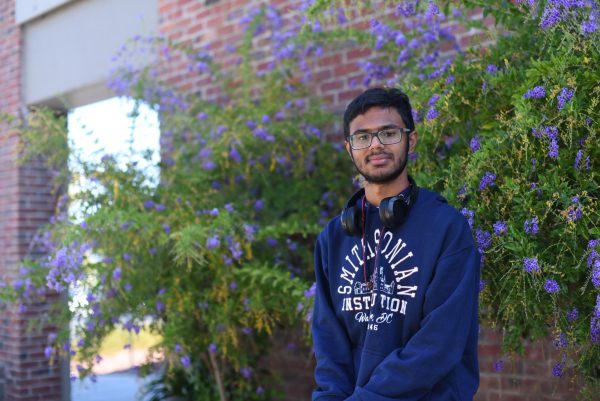World History and AP Macroeconomics teacher Scott Victorine recalls sitting in the car with his grandmother listening to the Beatles together. He finds this a distinctly impactful moment in his childhood. Music — specifically rock, metal and hip hop — has been a recurring joy throughout Victorine’s life.
“It was what everybody around me was listening to in school and what was popular at the time, and then I just jumped right into it,” Victorine said “When I got to college, I definitely started listening to more and more. Not just rock but hip hop and even some electronic music, and that’s where my music portfolio really diversified.”
Despite the variety of genres that Victorine listened to in college, he explains that a lot of the music communities in his life were filled with stereotypes that made it difficult for him to feel like a part of these communities.
“At the time, it was kind of like you listen to one or the other, that’s it,” Victorine said “It wasn’t as open minded as I would say it is today. If you listened to rock music, you were probably also a skater. If you listen to hip hop, you tended to dress in baggy clothes or sports related materials. It was one or the other, very few people listened to both. And if you did, you run the risk of being called out for being a poser.”
Victorine’s experience of being judged for the types of music he listened to is not rare. Sophomore Vikram Aditya Srikanth describes his own experiences with being judged for his music tastes.
“I mainly listen to EDM and also to classical music, and I definitely get a lot of flack because those are very conflicting [genres],” Srikanth said. “People think like I should make up my mind, and also in general, they think that I just say classical music, I don’t listen to it, and that I’m trying to be pretentious.”
Srikanth further explains the image classical music is a genre many see as pretentious and arrogant. However, Victorine states that as his musical tastes developed, the genre became something that he used to reflect his feelings.
“I’ll put on classical music when I want to unwind,” Victorine said. “I’ll put on something more electronic with a trippy kind of beat just to mellow me out. There’s other times I’ll put on classic jazz music, it depends on my mood.”
While Victorine has found that using classical music as a way to match his own emotions proves effective, Srikanth explains how others might not see the genre the same way. He explains that many who enjoy classical music play instruments themselves, creating a high barrier of entry for the community.
“There’s almost no way to socially learn about classical music,” Srikanth said “You can learn about hip hop or pop at parties or from people who listen to it, but there’s no way to really get into classical music. Even if you don’t play an instrument, it’s extremely dated, which definitely sucks because I think it is really cool. It’s actually good music and people should try it.”
Sophomore Rishi Salvi mirrors Srikanth’s experiences with his own exposure to the stigma surrounding the rock genre.
 “Generally rock is seen more as like a lonely, anger-inducing genre,” Salvi said. “They call people lonely, call people depressed for listening to rock, because it’s not a typical popular thing. If you really listen to a rock song, they get pretty vulnerable with the topics they cover, the emotions and how they express them. A lot of people don’t fully get the message behind it and just think of it as noise and without actually understanding the power of the instruments or the power of the lyrics.”
“Generally rock is seen more as like a lonely, anger-inducing genre,” Salvi said. “They call people lonely, call people depressed for listening to rock, because it’s not a typical popular thing. If you really listen to a rock song, they get pretty vulnerable with the topics they cover, the emotions and how they express them. A lot of people don’t fully get the message behind it and just think of it as noise and without actually understanding the power of the instruments or the power of the lyrics.”
Salvi goes on to explain how modern platforms have changed this perception, allowing people to more easily interact with different kinds of music and creating a more open environment around genres.
“I think it’s more normalized to really be yourself nowadays,” Salvi said. “You can like what you like at this point because everyone has their own opinions on music.”
However, in Srikanth’s experience, this normalization is not the case for a lot of the stronger and more deep rooted stereotypes, such as those surrounding classical music.
“I wanted to be able to connect with more people using music, but when you say classical, I feel like that almost pushes you away,” Srikanth said. “So it just became normal for me to not even bring up classical music, even with people who I think wouldn’t really care.”
Similarly to Srikanth, English, AVID and ELD teacher Mark Carpenter recalls their experiences in an environment that they felt was too intense for their tastes, alienating them from that scene.
“I’m in Los Angeles, and Crystal Methyd is playing a show at the Shrine Auditorium,” Carpenter said. “So, I buy a ticket and I go to the show, and I realize I’m at a rave. I don’t do drugs or know anything about fashion, and people are very neon, and obviously experiencing the music on a level that I can’t. So I just left, and that told me that that scene was not for me.”
Even so, Salvi explains the role of music and how people should not be pushed away from it by culture or stereotypes.
“I think music is very versatile in the sense that it serves many purposes, everyone should listen to a variety of genres and not hate on someone just because they listen to a different song than you,” Salvi said. “It’s important to understand that music tastes come in a whole spectrum, and it’s important to be accepting and welcoming.”









